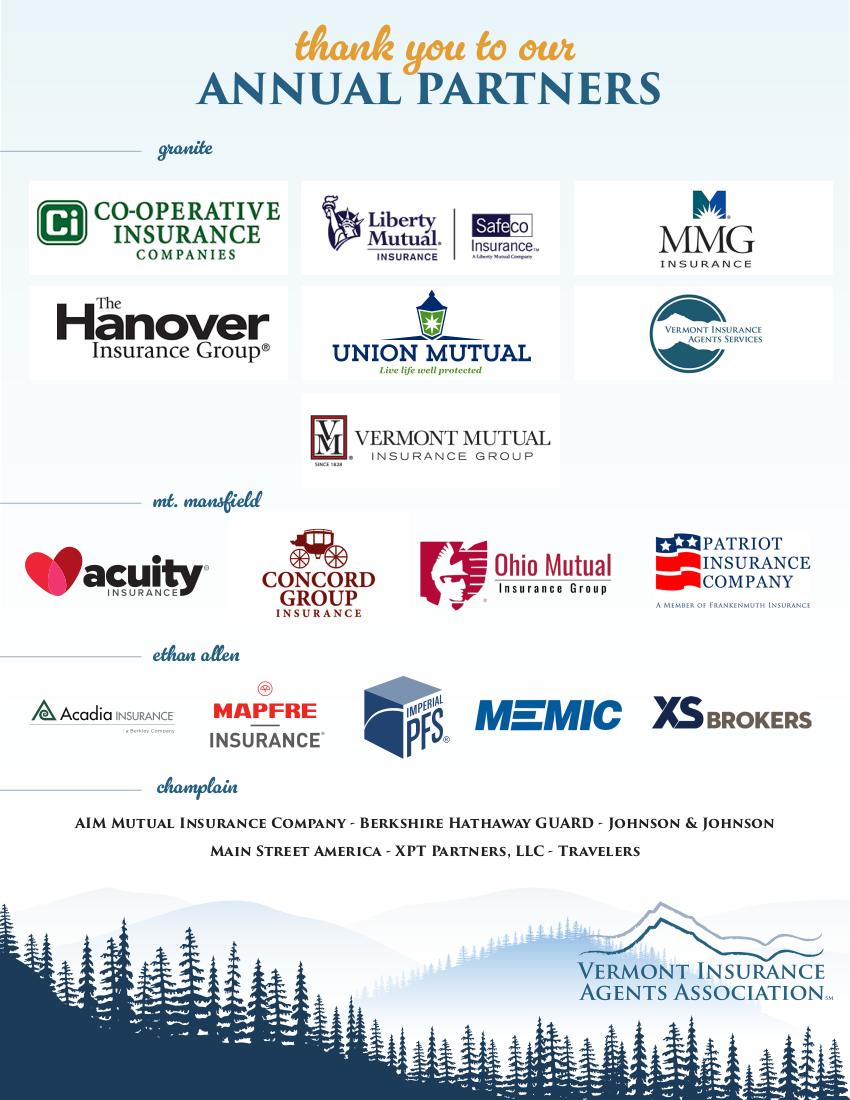













Thismonth’sissuefocusesonmergersand acquisitions(M&A),afactoflifeinour agencyuniverse.WhileM&Aactivityhas slowedduetorisinginterestrates,there aresomeimportantthingstoconsiderifyou aresellingorbuyinganagency Asyour association,weworktokeepyoucurrenton howtoprotectyouragency–andnowhere areyoumorevulnerablethanwhenyouare consideringasaleorpurchase.

Iencourageyoutotogetprofessionals involvedinvaluingyouragencyorthe agencythatyoupurchaseandinpreparing theproperlegaldocuments.VIAAcan provideyoureferralstoqualityconsultants whocanguideyouthroughtheprocessand protectyourassets,ensuringthatyoumake therightdecisionsfortherightreason.
RememberourSummerGolfOutingison Monday,July24attheVermontNational CountryClubinSouthBurlington.Weare expectingasolidturnoutsobesureto registersoonerthanlater.Visitourwebsite atwww.viaa.orgtoregistertoday.
Also,markyourcalendarsfortheVIAA AnnualConventionstartingSeptember18. WemovedtheeventtoKillingtonwhere we’vebeenabletonegotiategreatratesfor overnightrooms.Thecommitteeisworking onanagendathatwilldelivervaluetoall whoattend.Moredetailscoming!
ThroughyourmembershipinVIAAandthe Big“I”youhavemanyresourcesavailableto you.Iencourageyoutomakethemostof theseresourcesifyouaresellingyour agencyorbuyinganother.



The entire team at Royer Camp & Associated Insurance Inc. drove to the Vermont State House in Montpelier on March 22 to celebrate Edwin G. Camp from Derby, for his ongoing and tremendously successful, dedicated career in insurance. Representative Brian Smith presented Ed with a “Concurrent House Resolution" for his outstanding 58-year career in the Vermont Insurance Industry. Read More
The VIAA Annual Golf Tournament is scheduled for Monday, July 24 at Vermont National Country Club in South Burlington, VT. Mix and mingle with fellow agents and other industry professionals. Register Here

The VIAA Convention is scheduled for September 18-20 in Killington. Save the date and watch for more information!


The federal Consumer Financial Protection Bureau (CFPB) issued a long-awaited and sweeping data collection regulation that provided welcome news to the independent agent community. The CFPB had been considering the adoption of burdensome mandates that would have disrupted premium finance transactions but opted not to do so in its final rule, pointing to arguments made by the Big “I" in a comment letter.
Learn More
The Big 'I' has created a new four-part training series that will be accessible both online and through a workbook pdf —and is free for all Big “I" members. Learn More
Trusted Choice® has launched TechCompare, an online platform designed to you find and connect withtop technology vendors,each with a unique focus and expertise, to grow your agency.
Asa Big 'I" member,you are eligible for up to $1,000 in reimbursement when choosing to work with one or more vendor. See More
Spring is here and Trusted Choice® has new content available to assist you members with your social media strategy this season. Check out the full library of ready-to-use articles, graphics, videos and infographics you can use in your agency's messaging. See More

The best place to start in evaluating a potential acquisition is with you and your own agency. If you are clear on what you are looking for in an acquisition the process of evaluating opportunities becomes much more efficient and effective. Ask yourself these important questions:
What are your current agency goals? How does this acquisition help you achieve those goals?
It is always best to pause and consider what you are trying to accomplish to ensure that you are able to maintain focus. An acquisition is a big undertaking, so if it is not aligned with your overall goals, it can impact your ability to achieve what you are trying to accomplish.
Here are some questions to consider before you get too deep into the process of evaluating another agency. I believe these will help you determine if the acquisition opportunity has the potential to be fit for you and your agency.
What is your current growth plan? What would strengthen it?
Are you trying to grow into a new geographical location? Niche? Line of Business?
Are you looking to add a particular carrier or gain access to certain markets?
Are you looking to expand your team and expertise? Which roles? What expertise?
Are you looking to gain and develop future owners of your agency?
Are there specific relationships that you are trying to develop and build?
Are you looking to expand within your current footprint or into a new or complimentary niche?
We all know that acquisition add premium volume and revenue to your agency, but not all revenue is created equal. It is important to consider how a potential acquisition will fit into your overall plan. Once you have an idea if this potential acquisition fits into your overall plan, spend some time considering how it aligns with you and your agency. You will need to look at it from several perspectives including, geographic location, carrier and markets, current relationships and contracts, expertise, performance, customer type and behavior and most importantly culture.
What is the makeup of their book of business? What is the average size of their accounts? Are there any large accounts, specialized accounts, or accounts that would be at risk in a transition due to personal relationship with the current owner? Is the book heavy in personal lines, commercial lines, Life & Heath? If it is heavy personal lines, what percentage is home, auto, monoline? If it is heavy commercial lines, what is their focus, and do you have the right expertise to facilitate a seamless transition of their accounts? Are there opportunities to expand and cross-sell?
What type of customers does the agency attract? Gather data on their average account size, average policies per customer, where customers they located, and how long have they been with the agency. In addition, be sure to ask questions that help you understand the customers expectations and behaviors like: How often do you talk

to your customers? What percentage of your customers come into the office for appointments? To make payments? What percentage pay online? Utilize your app or website? Expect to pay in cash? What percentage of your customers have minimum limits or are monoline customers? Asking questions like these will help you understand the fit and alignment with your agency and your practices, the gap in expectations, the need for cultural change and ultimately help you determine the risk that may exist in retaining the business.
This is an area where alignment can make a huge impact and misalignment can do the same. What is the current carrier overlap? What will this purchase do to your volume, loss ratios, commission rates, potential contingencies, and overall revenue? For

those carriers that both agencies have access to, be sure to consider how each of the agencies are accessing the carrier. Do both agencies have direct appointments or is their access through a network or aggregator? Do not assume that the shared carrier will automatically move all of the business to be written under the direct appointment, based on your volume and performance the carrier may decide otherwise.
For the carrier appointments that differ, it is exciting to consider the potential impact that gaining access can have on your agency. It may open up an opportunity to cross-sell and expand your book, but do not overlook the process you need to go through to gain access to that carrier. You will need to
consider the approval process that the carrier has in appointing new agencies. You should not assume that the carrier will appoint you automatically upon the purchase of an agency. This consideration often times happens too late in the process and agencies are faced with rewriting books which is both time consuming and laborious on top of the integration activities that they are already facing.
There is no question that our world is getting smaller, but many agencies still have large concentration of their business within a close radius of their location. It is important to consider where the agency is located, and how much of their business is local. This will help you determine the need to maintain multiple locations, the potential commute time, and how easy will it be for the team to
work together and the potential synergies that may exist if this merger occurs. You will also need to consider how you will logistically manage the integration in the short-term and what the management of multiple locations will look like in the future.

One of the best indicators of the future is the past. As you are assessing the potential purchase you need to look at their performance. This will also tell you a great deal about the culture of the agency. The best place to start is with retention. What is their retention? This can mean many different things, so it is important to be clear on what their current retention rate is for revenue, premium, policies in force (PIF), and customers. What type of business are they losing? Is there a trend? Are they growing? What is their growth rate over the past three years? Where is their new business coming from? What is their loss ratio? What is their revenue per employee? Do they align with yours or will the volume of work that your agency handles be a shock to their staff?
The most valuable part of every agency is their people. They are the heart and soul of your business, the face of the agency and the core to the relationships. For many agency owners, taking care of their staff is one of the top priorities as they contemplate selling their agency. It is personal, their staff is considered part of their family. It is important that you take the time to understand the talent that exists, the desire to continue to work, their tolerance for change, how the team will fit together and complement each other and the culture and
expectations that team operates within. To gain an understanding of this, you will need to ask about tenure, roles, accountability, compensation, expectations and the current leadership and management styles. Is the staff used to a hands-on manager, weekly sales meetings and metrics or do they work in an environment that is completely autonomous? Gaining an understanding of the people, talent and culture is one of the most important steps in an acquisition. The current owner is a key player in any acquisition, you will need to understand their expectations and willingness to work to transition their customer, carrier and staff relationships as well as their desire to continue to work. All of these details greatly impact the expected future performance, ongoing costs and ultimately the price that you may offer.
Integration of agencies and cultures will require a good understanding of the technology, processes that exist in both organizations. The staff inside an agency that operates with paper files will have a big learning curve if they are transitioning into agency that operates completely paperless. Agencies that are on the same systems can also have a much smaller learning curve but should still expect a learning curve related to the utilization of the technology or the processes and procedures that vary between the organizations. Taking an inventory of all of the technology that is utilized as well as any processes and procedures that are in place is a healthy exercise in considering the fit between the agencies.
In addition, you need to look at all of the contracts that are in place and how they may impact the purchase. What do the corporate documents state for both agencies, and what is the process they must go through to sell or buy an agency? Does the agency have network, cluster, aggregator relationships that could impact the sale of their agency? What is the approval process and is continued participation in that group a requirement? Does that fit with your goals, and do you have any agreements or relationships in place that will prevent you from joining or that may cause you additional fees due to your carrier relationships? Do they have referral partners that may be impacted by a transition of ownership and change the future new business leads and future performance expectations of the agency? Are their vendor commitments that will need to be satisfied?
There is a lot to consider when purchasing an agency or even a book of business, and you should expect as you work through the process several other considerations will arise. If you stay focused on what your goals are and how this opportunity will help you achieve those goals, it will keep the process centered and focused. It is easy to fall in love with the idea of an acquisition. The more you know, the more likely you will make a strong decision that leads to a smooth transition. For more information visit www.agency-focus.com or contact Carey at carey@agency-focus.com

VermontMutualInsuranceGroup® wasagainrecognizedasoneof theBestPlacestoWorkinVermont byVermontBusinessMagazine andtheVermontChamberof Commerce.Thisistheeighthyear inarowtheVermont-based Property&Casualtycompanyhas beennameda“BestPlacetoWork” sincefirstenteringthestatesurvey andawardsprogrambackin2016.

ScottBoardmanwaselectedtothe BoardofDirectorsoftheUnion MutualFireInsuranceCompany andtheNewEnglandGuaranty InsuranceCompanyatthe Companies’annualmeetingsheld onMarch15,2023.Boardman retiredinFebruaryafter40+years withtheHickok&Boardman InsuranceGroup.

TheConcordGroupInsurance Companieshasrelocatedits CorporateofficefromConcord, NewHampshiretoBedford,NH.The move,drivenprimarilyby companygrowth,provides employeesofTheConcordGroup withalarger,morecontemporary, state-of-the-artofficespace..

MCHATTEN NAMED
PRESIDENT & CEO OF MMG INSURANCE

MMGInsuranceCompanyis pleasedtoannouncethatMatthew McHattenhasbeenappointedas President&ChiefExecutiveOfficer (CEO),effectiveJanuary1,2023. McHattenassumestherole followingtheretirementofLarry Shaw,whoretiredattheendof 2022afterservingasPresident& CEOofMMGfor28years.
VermontMutualInsuranceGroup®hasrecentlyelectedtwoprominent executivestotheCompany'sBoardofDirectors:TheresaAlberghiniDiPalma, formerSeniorVicePresidentforMarketingandExternalRelationsatThe UniversityofVermontHealthNetworkandMariMcClure,PresidentandCEOof GreenMountainPower.

VermontMutualInsuranceGroup® hasrecentlyelectedtwo prominentexecutivestothe Company'sBoardofDirectors: TheresaAlberghiniDiPalma,former SeniorVicePresidentforMarketing andExternalRelationsatThe UniversityofVermontHealth NetworkandMariMcClure, PresidentandCEOofGreen MountainPower.
UNION MUTUAL RAISES OVER $100,000 FOR SPECIAL OLYMPICS VERMONT
UnionMutualInsuranceCompanyisproudtoannounceitsPenguinPlungeteamof 44employees,vendorsandfamilymembersraisedover$100,000tobenefit SpecialOlympicsVermontduringthe2023fundraisingseason.


Every once in a while, the demographics align. Such is the case with younger producers’ desire to own agencies and older principals’ willingness to perpetuate to a new owner. The two necessary and vital forces of agency ownership—a new generation ready to take the reins and an older generation prepared to let go—are coming together.
Today, we’re seeing a new crop of younger agents who want to buy into agencies. And recent survey data shows that older owners may be more inclined to prepare for their agency’s succession.
According to the last few Agency Universe Studies conducted by the Big “I,” the average age of principals with 20% or more of ownership hovers
around 55 while the percentage of owners 55 and up is increasing. The majority of these owners have considered at least some basic perpetuation planning, including having children or other family members take over, other principals buy part or all of their interest, or an outside party buy their interest.
At the same time, agents and producers under 40 are optimistic about their prospects. They feel good about their career choice and the potential to earn income. Most of these younger agents see insurance as a permanent career, and many have aspirations to own an agency.

Agency values are robust and buy-sell activity remains vibrant. That agencies are an attractive investment, capable of generating recurring income and profitability, is an incentive for both buyers and sellers.
For example, JP Morgan’s 2022 Business Leaders Outlook survey revealed that the percentage of business leaders across industries with plans to transfer their company increased from last year and that the expected timeline for completing a transition accelerated. “The combination of challenging market conditions and favorable valuations could be driving more business leaders to consider selling their companies,” the report says.
In short, there is probably no better time for the orderly transition of a business from one generation to the next.
What’s the catch?
The catch is that retiring principals must proactively plan for succession. At the same time, prospective owners must take the initiative to identify ownership opportunities, ask themselves if there’s a chance to become part of the succession plan, and prepare themselves for a future management role. Both old and new generations must be intentional and actively involved in the process.
Often when agency owners reach retirement age, they haven’t given enough thought to succession. As a result, there’s a lack of qualifying candidates from within the agency to buy the business. This remains one of the leading reasons why principals sell to a third party.

Happily, there is a very good solution, and that’s a staged exit where a prospective buyer is identified early on and steps are taken to prepare that individual for ownership. A staged sale allows the exiting owner to cash in some chips now but continue to profit from growth until the agency is sold. It allows the incoming owner to earn equity and ease into their new role.
Let’s look a little further into how this can be accomplished and why today’s younger agents make ideal candidates for future owners.
Too many agency owners put off the preparation it takes to create and execute a succession plan. According to Reagan Consulting, “Poor planning in the areas of valuation, shareholder departure timing, repurchase terms and funding can render internal perpetuation virtually impossible, forcing a sale to outsiders.”
Principals should consider retaining the services of professionals who can properly value an agency; draw up a workable buysell agreement; and engage the legal, accounting and lending expertise necessary to ensure the smooth succession of their agency. An experienced agency valuation consultant can determine an agency’s value, which provides a benchmark and starting point to negotiate the agency’s selling price.
Most independent agencies are owned and operated by a single owner. Some seem to be more of an extension of the principal’s personality than a well-run business. Many are still paper based.
The main driver of agency value is cash flow. As agency owners begin to think about a transfer in ownership, they must put their house in order and maximize their agency’s value. That means having strong carrier relationships and a good performing book of business with strong customer retention. It means taking a hard look at expenses, income and cash flow. It means modernizing operations, moving toward a digital office and taking advantage of online tools. Maximizing value isn’t a quick process, and owners need to allow themselves the time to
accomplish it before they approach the negotiation table.
Younger agents aren’t afraid to try new sales channels, utilize agency management systems to their full capabilities or use technology to reach customers through online marketing.

Most of the young agents who fit the mold of an ideal successor are Millennials, and they are already making a name for themselves as entrepreneurs, small business owners and startup CEOs. This generation grew up in the age of the internet and personal computing. They see the value of technology and have mastered social media.
Young agents can help drive growth at a time when older producers are slowing down and are less productive. Younger agents aren’t afraid to try new sales channels, utilize agency management systems to their full capabilities or use technology to reach customers through online marketing. In fact, it’s the way they communicate with their peers, who also prefer to do business online.
Young producers who’ve purchased books of business and acquired agencies are experimenting with new marketing methods. They’re leveraging social media and mobile apps to establish a digital presence that, in turn, is propelling organic growth. Some are in specialty markets and have created a successful niche using online tools that allow them to reach consumers in multiple states.
Whether you’re a principal approaching retirement, or a producer interested in eventually owning, there are steps you can take now to prepare for the transition. Keep these points in mind:
Have the conversation early. Identify, train and mentor the up-and-coming leaders of your agency sooner rather than later. Don’t wait until the last minute to put together a written transition plan. We recommend a timeframe of at least five years. It’s about creating value for your agency over the transition period to reap the most from your business.
Determine how the sale will be financed. Will the seller finance the purchase? Does the new owner have equity in the firm? Is bank credit needed? If there is a loan, can the agency generate enough cash flow to cover the loan and run the operation? Prepare financially and emotion-ally to be an owner. Are you ready to take on the responsibility and risk of running a business? You may have to make short-term sacrifices for long-term gain to realize your dream of ownership. Are you commit-ted to getting your personal finances in order, which may mean making lifestyle changes? What’s your willingness to take on risk and debt? Prepare to borrow before you need to.
Develop the skills needed to run an agency. Pursue continuing education to round out your knowledge of accounting, finance and management. Can you successfully transition from employee to management? Learn to develop employees and build teams. Familiarize your-self with the agency’s management system. Do you have a firm grasp of the agency’s sources of income and its expenses? Do you have experience in securing carrier appointments? How will you reduce expenses to maintain cash flow so you can service your debt?
Industry’s future
The path to ownership can be challenging, but there’s no better time for young producers to invest in the independent agency system. With young agents’ proficiency in all things digital and their diversity and commitment to making a positive impact on society, the future of the independent agency system is in capable hands.
Scott Freiday is senior vice president and division director, and Keith Mangini is vice president and commercial loan officer at InsurBanc, a division of Connecticut Community Bank, N.A. They have helped hundreds of agents finance acquisitions and grow their agencies. InsurBanc is a communityfocused commercial bank specializing in products and services for independent insurance agencies. Organized in 2001 by the Big “I,” InsurBanc partners with agents to help them optimize growth opportunities and manage their agencies efficiently.


Mostagencyerrors&omissionsclaimshavesomecommonalityThisarticlepresentsa fewexamplesyoucanusetopreventapotentialclaimagainstyouragencywhen managingclientsignatures.
Allofthepotentialerrorsandomissions(E&O)problemsbelowhaveacommonissue. Canyoutellwhatthatis?
Youmailarenewalapplicationfromyouroffice,pre-filledwithlimitsfromyour agency’sautomatedsystem.Youraskinyouremailthatyourclientreviewthe applicationandsignit.Theclientemailsitbackwiththemessage,“Looksgood.No changes.Thanksforyourhelp.” Sevenmonthslater,theinsuredhasalossand learnstheirlimitsareinsufficient.
2. Noneofyourstandardcarrierswillwriteanewlyestablisheddaycarecenter.You placeitwithanon-admittedcarrierthroughasurplusbrokerwithwhomyouhave workedforyears.Yourinsuredcompletedtherequiredapplication,butyouhadto followupfortheaffidavitofnoticeoflackofaccesstothestateinsurance guaranteefund.Thecarrierissuedthepolicycontingentonreturningthesigned affidavit.Towardtheendofthepolicyperiod,thecarrierbecameinsolventandwas unabletorespondtoaclaimthatotherwisethepolicywouldcover.Theaffidavit maybecomecrucialindefendinganypotentialE&Oclaim.
3. Asatisfiedclientrefersaprospecttooneofyouragency’sproducers Theproducer hand-completedtheapplicationfornewbusiness The“priorlosses”sectionofthe applicationwasclearlymarked“none”Sevenmonthsafterpolicyissuance,the insuredsubmitsaclaim Althoughthelosswouldnormallybecovered,thecarrier deniestheclaimbecauseitdiscoversarelevantpastlossthatoccurredpriortothe policy’seffectivedate.Thecarrierrescindsthepolicybacktoitsoriginaleffective date.
Anaccountmanagerroundsouta homeownerspolicywithapersonal autopolicy.Theaccountmanagerand clientdiscussanumbrella,buttheclient willnotaccepttheminimumliability limitsontheautopolicyrequiredforthe umbrella.Laterinthepolicyyear,the insuredhasaseriousautoaccidentfor whichthecurrentautopolicylimitsare insufficient.
Didyoufindthecommonelementin eachofthosepotentialE&Olosses?In eachcase,theclient’ssignaturewillbe crucialintheagency’sdefense
Didyoufindthecommonelementineach ofthosepotentialE&Olosses?Ineachcase, theclient’ssignaturewillbecrucialinthe agency’sdefense.
Inthefirstcase,theemailattachedinyour systemtotheclientfilewillbehelpful.Itwill bemorehelpfuliftheclientsignsthe renewalapplication.
Inthesecondcase,youwouldfeelrelieved ifyousavedtheinsured’ssignedaffidavit.
Inthethirdcase,theinsured’ssignatureon theapplicationwillprotecttheagencyfrom theinsured’sallegationthat“Itoldyou aboutthatpriorlossandyoufailedtoputit ontheapplication”
Inthefourthcase,thesignedapplication, alongwithadocumentedsystemactivity, willrecordthattheproducerdiscussed higherlimitsalthoughtheinsuredrejected them.
Whilee-signaturesarecommonand convenientforboththeagencyandthe client,therearestillmanyoccasionswhere theinsuredcompletesanapplicationinpersonoremailsittotheagencyupon
signing.Itissafetosaythatallagencies realizetheneedtosavesignature documents.Manyof thoseagencieseither savetheemailedapplicationor“scanand attach”thein-personapplicationand shredtheoriginal.

Whileakeywordinmanyindustriesis “paperless,”reconsiderhowbestto documentandsecuresignature documentsItisnotuncommonforan insuredtoallegethattheagency“created” theevidenceandthatdocumentisnotthe actualsignatureoftheinsuredwhen confrontedwithalimitedorrejectedclaims settlement.Defendingthecasemayrequire theaddedexpenseofahandwritingexpert, becausewithoutthatexpert,theinsured’s testimonymayconvincethejury,resulting inaverdictagainsttheagency.
Therefore,thesafestoptionistosavethe originalhard-copysignature(orsecureit insteadoforinadditiontotheemailed copy).BrianButcher,JD,CPCU,Vice President-ClaimsCorporateSolutionsat SwissReoffersthisperspective.
“Ithinkitis…helpfultoobtainahardcopyof thesignedapplicationinthosesituations whereeverythingisdoneonline.Partofthe thoughtbehindmyrecommendationto printandsavedocuments,especially applications,wastohaveahardcopy showingtheinsuredhadsignedthe applicationandthatthesignaturewas his/hersignature,”Butcherrecommended DefenseCounselSpeaks
MyanecdotalsurveyofE&Odefense attorney’sechoesMrButcher’scomments Whenasignatureisanintegralpartofan agency’sdefense,attorneyssurveyed agreethattheypreferthemore“bulletproof”optionofahardcopy,“blueink” signature.
Inmoststates,theagentisresponsiblefor procuringthelimitsandcoverages requestedbytheclient.Therefore,itiswise tobeabletoshowwhattheinsured requested.AspointedoutbyMr.Butcher, “Thesignedapplicationisgoodproofin E&Oclaim,thattheagencyprocuredthe coveragerequestedbytheircustomeras
the signature is arguably the insured’s attestation as to what coverage they wantedandwhatlimitstheywanted.”
Currentlyandforthenearfuture,inflationis a huge factor in property and property damageclaims.Priorpolicylimitsareoften insufficientfortoday’srepair,buildingand settlements. “We often find ourselves in a situationwherethecarrierrenewsapolicy, sometimes for years,” Mr Butcher continued, “ without getting a signature again on an application This can be problematic where the cost of constructionhasrisenovertheyearsand the insured is suddenly ‘underinsured’ for thelosssustained.”
Often agencies “renew as is” and feel pressured for time to converse with their clients about updating limits and documenting those conversations with substantive activity notes and updated signedapplicationswhereneeded.

Attaching relevant emails, documenting conversations as date-stamped activities intheagency’smanagementsystemand followinguponopenitemsdiligentlyareall good documentation rules to keep the agencysafe.Inaddition,onedeviationfrom paperless–keepinghardcopiesofsigned applicationsandsimilardocuments–can be one additional precaution to keep the agencysecure
Virginia Bates is President of VMB Associates Inc which provides consultations on agency profitability, financial reporting, human resource development, compensation plans, and E&O security Bates conducts E&O for-credit auditsandagencyvaluations, andassistsinagencysales, perpetuations, and transitions She is familiar with a wide array of agency technology and is the founder of VMBHits.com which is a testing site to determine hiring desirability and educational needs of staff She regularly conducts classes on technical, sales and management topics


